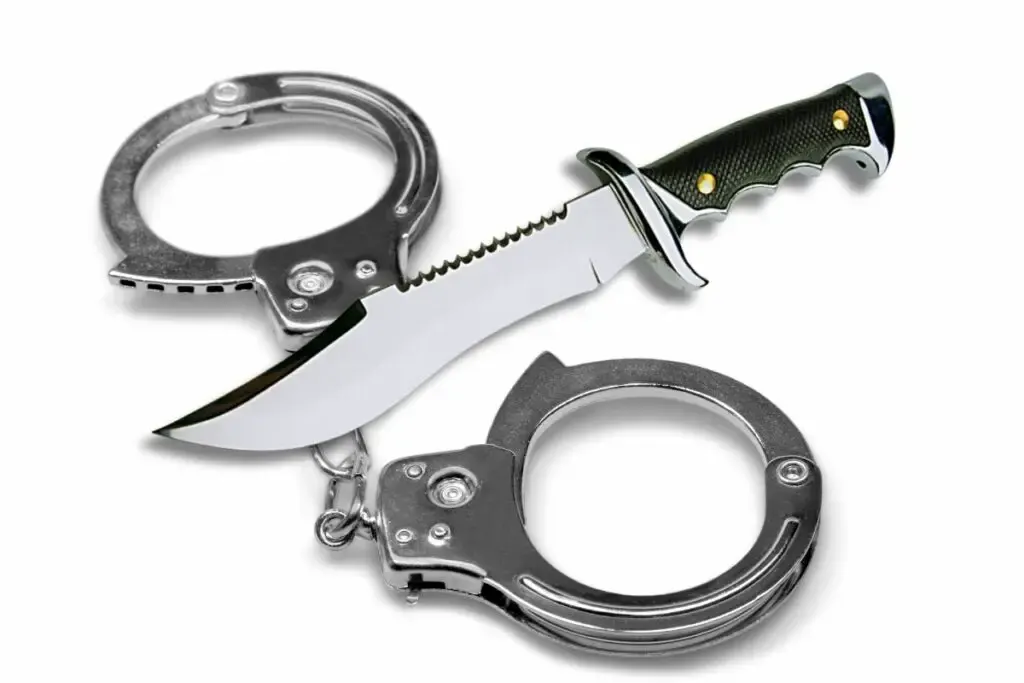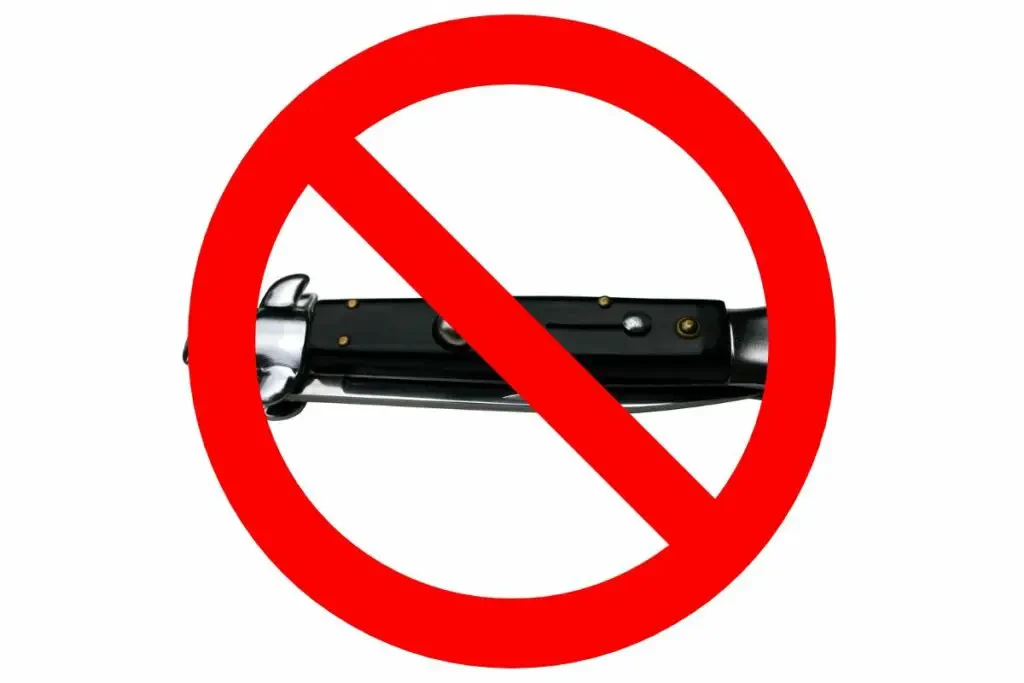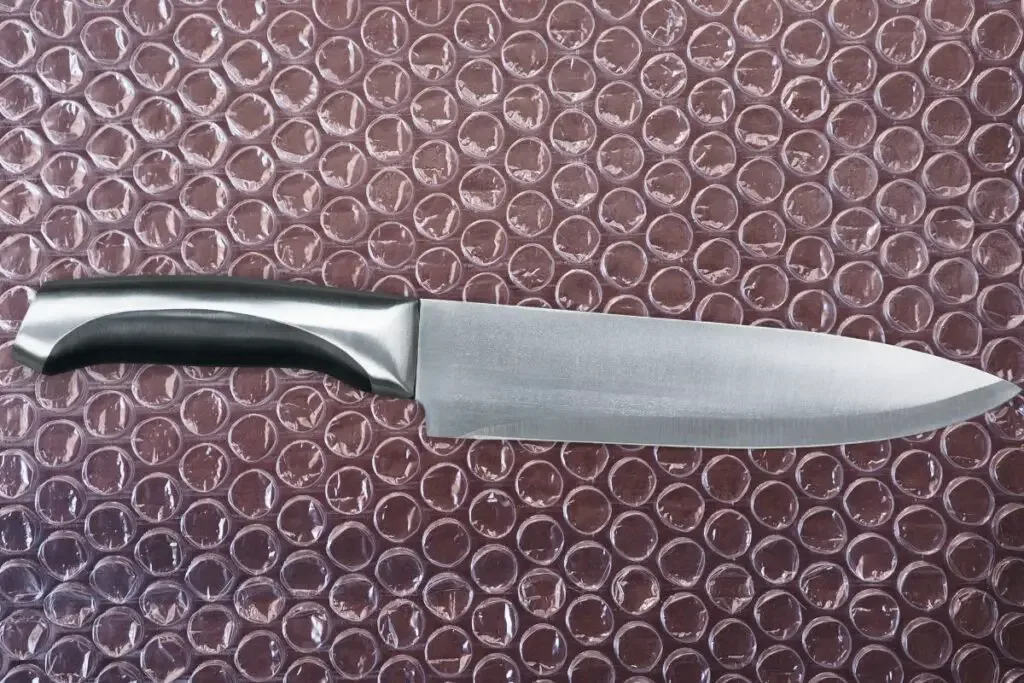As an Amazon Associate, we earn from qualifying purchases with no additional costs for you.
A problem frequently plaguing knife owners, buyers, and sellers is how to ship the knives to their destination. You should be aware of various complications with this delivery method before dropping knives in the mail for shipment.
Knives can be shipped or mailed, but regional restrictions and regulations exist on the types of knives and knife sizes that can be shipped. There are risks associated with mailing knives, including the loss or damage of the knives or confiscation by authorities if the knives contravene regulations.
Mailing or shipping knives is a complex topic requiring research before committing to this delivery method. Regulations vary between regions, and the safety of your knife in the mailing process can be questionable in certain circumstances. We will discuss the ins and outs so you can determine if this is the best way to ship your knives.
If you are interested in checking out the best roll-up knife bag, we recommend trying Dalstrong Nomad Knife Roll. You can find it by clicking here (Amazon link).
Can Knives Be Mailed

Knives are one of the most versatile and useful tools that people use in their everyday lives. They are used in various activities, including cooking, outdoor recreation, hunting, and even self-defense.
However, when it comes to shipping knives, there are many regulations and restrictions that need to be considered. Whether knives can be shipped or not is commonly asked, and the answer is not as straightforward as it may seem.
We will delve into the intricacies of knife shipment and explore the legal and safety requirements involved. We will provide an overview of the types of knives that can and cannot be shipped, packaging and labeling requirements, and carrier rules for shipping knives.
We will briefly touch on international knife shipment laws and how they differ from regional or domestic shipment laws.
It is essential to understand the regulations surrounding knife shipment to avoid legal problems and ensure the safe delivery of your knives.
It is important to clarify knife shipment regulations whether you are shipping knives or if you are the recipient of a knife being shipped.
Potential Problems Mailing Knives
Mailing knives can be complicated, especially since knives are considered dangerous items and are subject to restrictions and regulations.
You may encounter several potential problems when choosing to ship your knives.
Legal Restrictions For Shipping Knives

One of the biggest potential problems when mailing knives is legal restrictions. Knives are regulated at the federal, state, and local levels, and you must be aware of the laws that apply to your situation.
Some types of knives, such as switchblades, spring opening knives, and certain knife designs, are illegal in many states and cannot be mailed.
You need to be aware of the knife laws in the location where you are shipping from and the regulations in the territories the knife will pass through in transit and in the destination location.
Failing to understand these legal restrictions can result in the knife being confiscated or impounded by local authorities and may result in prosecution for the sender and recipient.
Carrier Restrictions For Shipping Knives
Another potential problem is carrier restrictions. Not all carriers allow the mailing of knives and those that allow it may have specific restrictions on the knife types and sizes that can be mailed.
For example, some carriers may not allow knives with blades longer than a certain length or knives that can be used as weapons.
The carrier can impose these restrictions even if the knife shipment is not contravening any legal regulation. The carrier often implements these restrictions for the safety of their staff handling the packages during transit.
Damage Or Loss When Mailing Knives
When mailing knives, there is always the risk of damage or loss during shipping. Knives are fragile and can easily be damaged if not packaged correctly.
Additionally, if the package is lost or stolen, recovering the knives or receiving compensation for their value can be challenging.
Damage or loss of the knife in transit is of particular concern for knives with high value due to rarity, expensive materials, or sentimental value.
Monetary compensation for this loss may not be sufficient to reimburse you, particularly if the knife had sentimental value.
A friend of mine once gave me a piece of good advice. “Never ship a knife you are not willing to lose.” While this may sound a little extreme, the principle holds true. If the knife has personal value, find a better, more secure way to transport it to its destination.
Customs and International Regulations For Shipping Knives
If you are mailing knives internationally, you may encounter additional problems, such as customs regulations and import or export duties.
Different countries have varying laws, restrictions, and regulations regarding the mailing of knives, and it’s essential to research the destination country’s laws and regulations before mailing knives.
For this reason, many knife makers restrict the sale and delivery of their knives to their own country rather than tackling the red tape associated with international shipping.
Mailing knives can be a complicated process that requires careful attention to legal restrictions, carrier regulations, packaging and labeling requirements, and the risk of damage or loss.
Considering these potential problems and taking the necessary precautions, you can ensure your knives arrive safely and comply with legal regulations.
TIP: Did you know there are also restrictions regarding carrying knives on public transport? Read all about the regulations when transporting a knife on a bus here!
Complete Guide: Taking Knife on a Bus in the United States
Shipping Restrictions On Knives

The shipment of knives is regulated by both federal and state laws, which aim to ensure public safety and prevent the use of knives for criminal activities. Understanding the legal restrictions on knife shipment is crucial to avoid legal issues and ensure your knives are delivered safely.
The laws surrounding knives vary from state to state, and it is essential to know the laws in your state before shipping knives.
In general, knives are categorized as either deadly weapons or tools, and the legal restrictions on their shipment depend on this classification. Some states have strict laws on knives, while others have more relaxed laws, making it challenging to have a uniform policy on knife shipment.
Due to the legal restrictions on knives, there are specific rules that carriers must follow when shipping knives.
For example, carriers must verify the recipient’s age to ensure that they are legally allowed to possess the knife. Also, some carriers may require that knives be shipped separately from other items to ensure safe delivery.
Federal And State Laws on Knife Shipment
The federal government regulates the shipment of knives through the United States Postal Service (USPS), which has specific regulations on the shipment of knives.
USPS prohibits the shipment of certain types of knives, such as switchblades and balisongs, across state lines. Additionally, some states have specific laws that prohibit the shipment of knives within their boundaries, regardless of the type of knife.
Carriers must follow specific legal restrictions on knife shipment to ensure safe delivery and avoid legal issues. Understanding these restrictions before shipping knives and complying with them is essential to prevent legal or safety issues.
Types of Knives That Can Be Shipped
Not all knives can be shipped, as some are prohibited by law due to safety concerns. However, many types of knives can still be shipped legally.
It is essential to know which types of knives are allowed for shipment to ensure that you comply with laws, regulations, and restrictions to avoid complications.
Knives That Are Legal For Shipment
The most commonly shipped knives include kitchen knives, pocket knives, hunting knives, and multi-tools. These knives are considered tools and are generally not regulated unless they have specific features that make them illegal, such as a switchblade.
In some areas, these knives have limitations on the legal blade length, making it essential to ensure that the knife you intend to ship does not contravene any federal or state laws.
Types Of Knives With Restrictions
Certain knives have specific restrictions, such as blades that are longer than a certain length or blades made from specific materials.
For example, some states prohibit the shipment of knives with blades longer than 3 inches or knives made from materials like ceramic or titanium.
Knives Prohibited For Shipment
Specific types of knives are prohibited for shipment across state lines or even within certain states. These include switchblades, gravity knives, balisongs, and other knives considered deadly weapons.
Mostly, knives considered deadly weapons are those that are commonly used in the committing of crimes. This may result in some knives being legal in some states but illegal in others and prohibited for shipment.
This once again drives home the point of researching the regulations relevant to your location and the knife’s destination. Additionally, some states have specific laws that prohibit the shipment of knives altogether, regardless of their type.
Many types of knives can be shipped legally, but it is essential to ensure that they comply with federal and state laws. It is important to note that certain types of knives have restrictions while others are prohibited, making it essential to know what these are before attempting to ship them.
TIP: Packaging knives correctly for moving is equally as important as packaging knives for mailing. We have some expert tips to protect your knives during your move!
Packing Kitchen Knives For Moving (7 Proven & Safe TIPS)
Packaging And Labeling Requirements When Shipping Knives

When shipping knives, packaging and labeling them correctly is crucial to ensure they arrive safely and comply with legal requirements.
Proper packaging and labeling also help to prevent any confusion or mishandling during shipment. It is not wise to try and mislead carrier companies as to the contents of the package to try and get an illegal knife delivered.
Most packages are x-rayed before shipment to establish whether contraband is concealed in the package, and a knife would appear in this examination.
Packaging Requirements For Shipping A Knife
Knives should be packaged securely to prevent them from moving around during shipment, which could cause damage or injury.
Knives with sharp edges or points must be wrapped in protective packagings such as a combination of bubble wrap, stiff cardboard, or foam to prevent them from cutting through the packaging. Additionally, knives should be placed in a sturdy box that is the appropriate size for the knife to prevent movement during shipping.
Labeling Requirements For Shipping Knives
Carriers require specific labeling for knife shipments to ensure they are handled correctly and comply with legal requirements.
The label requirement varies from carrier to carrier, with some insisting that knives be labeled as such so they can be handled with the appropriate care. Others recommend that you do not indicate on the label that your package contains a knife to avoid theft. In this case, simply label the package as “Fragile: Handle with Care.”
The carrier may also require that the package be marked as “adult signature required” to ensure the package recipient is of legal age to possess the knife.
TIP: If you are interested in buying a Japanese knife, we recommend these knives (Amazon links):
- Santoku: Yoshihiro NSW Hammered Damascus Santoku
- Gyuto: Yoshihiro VG-10 Hammered Damascus Gyuto
- Nakiri: Yoshihiro Hammered Damascus Nakiri
How To Ship Or Mail Knives
Shipping knives may seem complicated due to legal restrictions and carrier regulations. However, with the right information and preparation, shipping knives can be done safely and efficiently.
We have compiled some tips to follow which may help you get your knives safely to their destination.
- Know the legal requirements. Before shipping knives, it is crucial to know the legal requirements in your state and any states the package will be shipped through. This includes knowing which types of knives can be shipped legally, any size or material restrictions, and any labeling requirements. Failure to comply with legal requirements could result in the confiscation of the knives or legal action.
- Choose the right carrier. Not all carriers allow the shipment of knives, and some have specific regulations on the type of knives that can be shipped. Choosing a carrier that allows knife shipment and following their regulations is essential. Popular carriers that allow knife shipment include UPS, FedEx, and USPS.
- Package knives securely. As mentioned earlier, knives should be packaged securely to prevent movement during shipment and to protect the package’s contents. The knife should be wrapped in protective materials like bubble wrap or foam and placed in a sturdy box. The box should be the appropriate size for the knife to prevent movement or penetration of the knife through the box and should be sealed with strong tape.
- Label the package correctly. Proper labeling of the package is essential when shipping knives. The package should be labeled as “fragile” to indicate that the contents are delicate and “adult signature required” if the carrier requires it. Additionally, the package should have a label that indicates that the package contains a knife and has specific warnings about the contents.
- Insure the package. Insuring the package when shipping knives is recommended to protect against loss or damage during shipping. Most carriers offer insurance options for packages at an additional cost.
Shipping knives can be done safely and efficiently by researching the rules in the sending and destination locations. Follow the rules, package the knife correctly, and consider these tips to ensure your knives arrive safely and comply with legal regulations.
International Knife Shipment
Shipping knives internationally can be more complicated than domestic shipping due to varying laws and regulations in different countries.
Before shipping knives internationally, it is crucial to research the laws and regulations in the destination country to ensure compliance.
Research The Destination Country’s Laws For Shipping Knives
Different countries have different laws, restrictions, and regulations regarding the shipment of knives. Researching the destination country’s laws and regulations regarding the type of knives that can be shipped and any labeling requirements is crucial.
Failure to comply with these laws could result in the authorities confiscating the knives or legal action taken against the sender or the recipient.
When shipping knives internationally, choosing a carrier that allows the shipment of knives and follows regulations in both the origin and destination countries is essential.
Different carriers may have different regulations and restrictions for shipping knives, so it is crucial to research and choose the best carrier for your needs.
Your carrier should be able to advise you regarding any special labeling or packaging requirements for the destination country.
Customs And Duties For Shipping Knives Internationally
The package may be subject to customs inspections and duties when shipping knives internationally. In some cases, you, the sender, may be required to pay all the export and import duties up front, so you would need to include this cost in the sale price of the knife if you are a seller.
Even if you are not a seller but sending the knife as a gift, import, and export duties according to the knife’s value may be imposed on the package.
In other cases, the recipient may be required to pay import duties on the knife before it is released to them by the carrier.
The rules differ from country to country, so it is important to research the regulations for each country you are mailing knives to.
Shipping knives internationally requires careful research and preparation to ensure compliance with legal requirements and safe, successful delivery.
Conclusion
Shipping knives can be daunting due to legal restrictions and carrier regulations, but with the right information and preparation, it can be done safely and efficiently. It is important to know the legal requirements in your state and any states the package will be shipped through, choose the right carrier, package the knives securely, label the package correctly, and insure the package.
When shipping knives internationally, it is crucial to research the laws and regulations in the destination country, choose the right carrier, package and label the knives correctly, and provide any necessary customs documentation. Always prioritize safety and compliance when shipping knives to ensure a smooth and successful shipment.
TIP: Are you interested in ordering a custom knife? Find out in our article whether it is worth the investment and what to look out for when buying a custom knife!
Custom Knives: Should I Buy One? (Costs, Investment & More)
